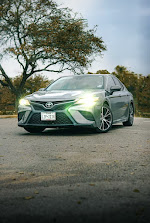PricewaterhouseCoopers
* Says second hand car market will be extinct by 2034
Crusoe Osagie

PricewaterhouseCoopers (PWC) on Thursday predicted that the Nigerian auto industry is expected to produce about four million cars annually by 2050, noting that given the nation’s growth projections to be the ninth largest economy in the world and continued government support, the industry is expected to begin actual manufacturing with components locally sourced.
* Says second hand car market will be extinct by 2034
Crusoe Osagie

PricewaterhouseCoopers (PWC) on Thursday predicted that the Nigerian auto industry is expected to produce about four million cars annually by 2050, noting that given the nation’s growth projections to be the ninth largest economy in the world and continued government support, the industry is expected to begin actual manufacturing with components locally sourced.
A PWC report presented by a Partner at the firm, Mr. Andrew Nevin,
explained that the projected growth requires sustained and effective
investment in the auto industry made only possible by the government
implementing political, economic and legal policies that create a
suitable environment for such investment.
Nevin who did the official presentation of the PWC auto industry
report, during a seminar organised by the automobile and allied product
group of the Lagos Chamber
of Commerce and Industry (LCCI), added: ”We created three scenarios in this case depending on growth rate and the government support to the auto industry. By 2050, production in this country will hit almost seven million vehicles.
of Commerce and Industry (LCCI), added: ”We created three scenarios in this case depending on growth rate and the government support to the auto industry. By 2050, production in this country will hit almost seven million vehicles.
This sounds like an extraordinary number, but the population of Nigeria
in 2050 could be larger than the population of the United States and
the production currently in the United State is about 18 million
vehicles and since Nigeria is going to be the ninth largest economy in
the world by 2050, we expect that with an indigenous auto industry, it
would be large.”
He however stated that imported used vehicles popularly referred to as
‘Tokunbo’ cars will become non-existent by 2034 as a direct result of
local production.
“We believe that by 2050, Nigeria should produce over 4 million vehicles. We have also created a pessimistic scenario, which is the third scenario because the world might not turn out the way we think, but even with the pessimistic scenario, Nigeria will be producing about two million vehicles. Essentially, PWC is saying that by 2050, Nigeria is going to be a market that makes at least four million new vehicles a year and would also stop importation of used vehicles,” he added.
He said for Nigeria to fully accomplish it’s potential of becoming
Africa’s automotive hub, there is need to improve the chances of owning
cars, pointing out that available vehicle financing oprions is very
important to encourage patronage of locally assembled cars.
He added that research indicated that 63 per cent of Nigerians cannot
afford to own a car without some form of support to own a car.
He said Nigeria must also tighten its borders, maintaining that cars
are the most smuggled goods after food between Lagos and Seme border.
“Grey market imports are thought to account for half of new vehicle
sales in the country. Imports through the grey market are done to reduce
or avoid duty payments by declaring false information.
He said there is also need to protect the consumers, stating that with
Original Equipment Manufacturers (OEMs) setting up their operations in
the country, it is imperative that similar quality control attained in
other developed markets is adhered to locally.
”There is also going to be the need for experienced car people, Nigeria
can achieve its potential to produce over 7 million cars by building
and working with people that really understand the industry. We believe
that the Nigerian auto industry in 2050 would be producing up to 4 to 7
million cars, but it needs the support of the government policies and
the industry to do the right things,” he said.
Earlier, the President, LCCI, Alhaji Remi Bello, said the potential of
the auto industry in Nigeria remained very strong, pointing out that
according to figures from the National Automotive Council (NAC), at full
capacity, the Nigerian automotive industry has the potential to create
70,000 skilled and semi skilled jobs along with 210,000 indirect jobs.
“According to the report, about 490,000 other jobs would also be
created in the raw materials supply for the industry. A strong and
flourishing automobile industry, no doubt, is strategic to economic
growth and development,” he said.
He said statistics from a foremost online automobile platform, reveals
that global automotive sales for 2015 are expected to reach $89 billion,
a 2.4 per cent growth from 2014.
According to him, with over 170 million population, the demand for
automobile in Nigeria has been on the increase, saying that Nigeria was
the highest automobile related web search and inquiries in 2014 with an
estimated market worth of over $6 billion.
He said the ugly trend of Nigeria’s heavy reliance on auto imports,
which accounts for one of the largest share of the country’s foreign
exhange use each year remains the most challenging issue in the
industry.Curled From This Day News.http://www.thisdaylive.com/articles/pwc-nigeria-s-auto-industry-to-produce-4m-cars-annually-by-2050/224177/
Tags:
Car Talk
